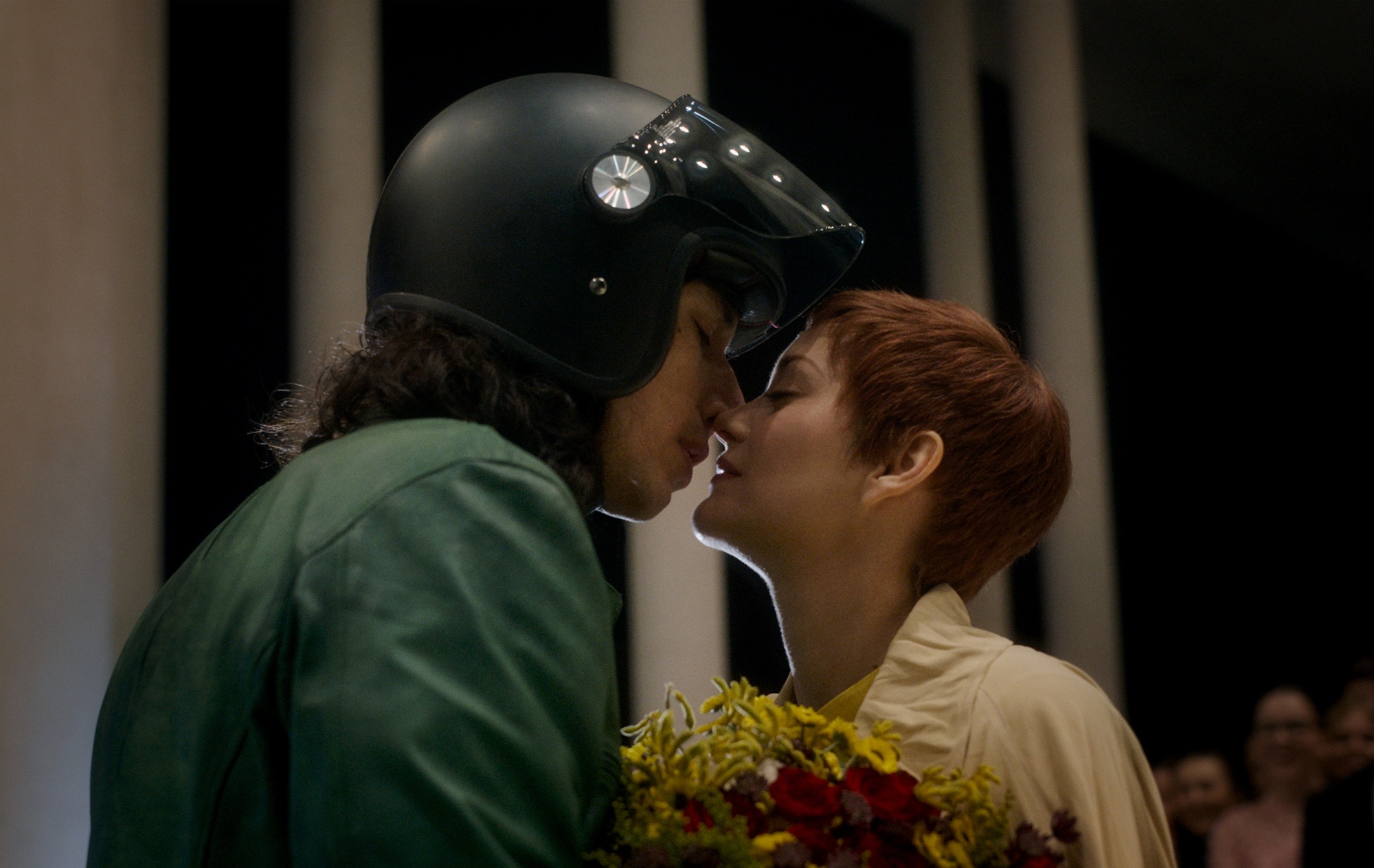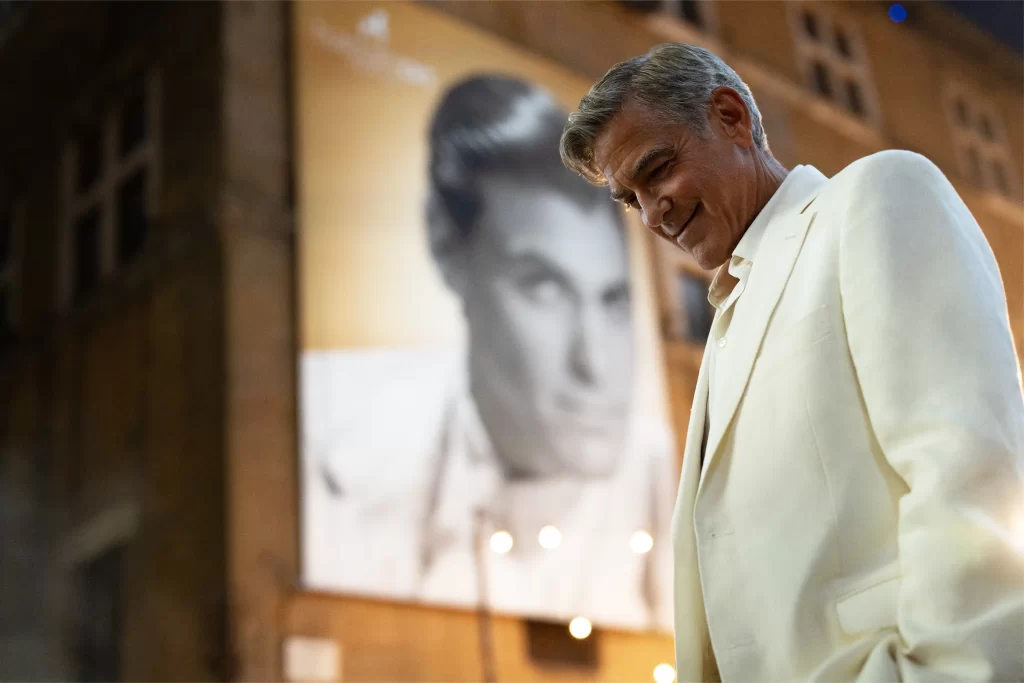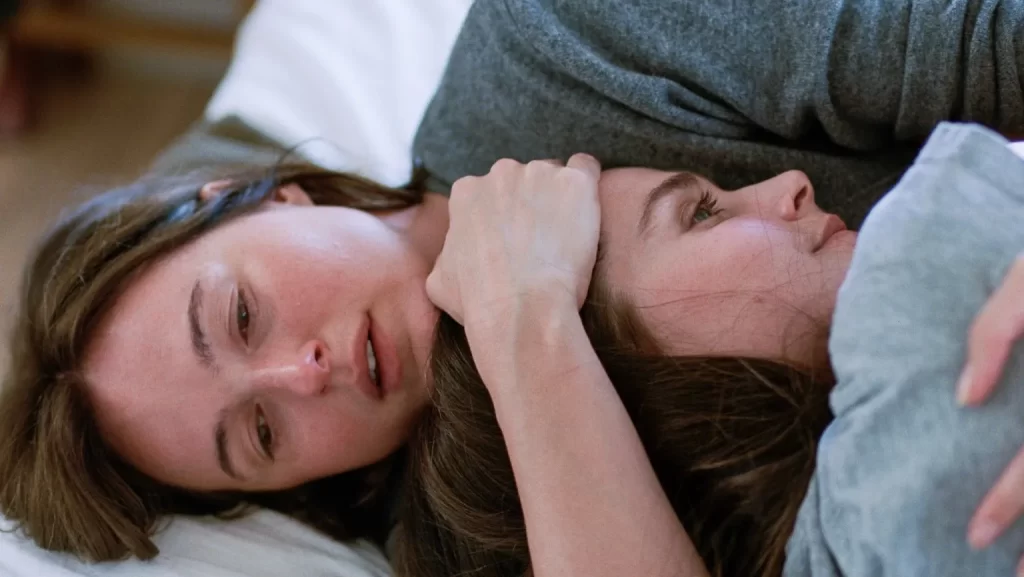“Ladies and gentlemen, we now ask for your complete attention,” begins the announcement that opens Leos Carax’s Annette, and as the booming voice proceeds to give us our instructions for consuming the picture to come, it’s clear that we’re in for something well outside the norm. That passage seems like something out of a Monty Python movie (Holy Grail, to be specific); we then seem to move into some kind of a rock documentary, as we find Sparks – who wrote and perform the film’s many, many songs – in the studio. “So, may we start?” they sing playfully, and now sooner have they begun singing than they stroll right out of the studio, the picture’s stars and supporting players joining them on the way out to the street, the lot of them strutting and singing and having a ball.
And at that early point, I was basically all in on Annette, a delightfully daft mish-mash of love story, vernacular opera, show-biz parable, and free-floating weirdness.
Adam Driver and Marion Cotillard are Henry and Ann, the lovers at the story’s center, and they’re a study in contrasts – opposites attract and all that. He’s gangly and she’s petite, he has flowing locks and she has a Jean Seberg cut, he’s low culture and she’s high; he’s a stand-up comic and performance artist of some notoriety, while she’s an opera singer of great renown.
We join their romance in progress, in a honeymoon phase of intensity and lust (including, yes, a sex scene that is such a matter-of-fact throwaway that the hubbub surrounding it out of Cannes is frankly embarrassing for those involved). Soon, they have a baby daughter, Annette – first seen as a doll (in what this viewer took as a sly dig at Clint Eastwood), but then as a puppet, an old-fashioned one, with overly artificial features and big hinges where the joints would be. The puppet is, in a way, a metaphor for the entire film; it sounds utterly insane, and it shouldn’t work at all, and it certainly calls attention to itself in a way that prevents the audience from fully engaging with it, and yet… And yet, it’s hauntingly effective, more, perhaps, than conventional techniques.
Not long after Annette’s arrival, voices on the soundtrack warn, “Something’s about to break / but it isn’t clear,” and (as redundant as this may sound), that’s when things really start to get strange.

Driver is credited as a producer, and it’s easy to see why – this is the kind of role many any actor would give up a limb to play. In a long, strange, tricky scene, we see Henry losing his grasp on his audience, his persona, and maybe himself in front of a Vegas audience, and after that he comes to fancy himself a Lenny Bruce type, with the kind of baggage that entails. It’s a dark, brooding character, and Driver is unafraid to dip into its valleys; late in the picture, he has a close-up, of Henry watching and grinning with a combination of pride and panic, that’s some of the best acting he’s ever done.
Cotillard, sadly, has much less of a character to play; her primary character trait seems to be her consumption of apples, which is a little on the nose, even for a rock musical. So it goes in male-penned romances; the Maels are, unsurprisingly, more comfortable crafting songs than characterizations, and Carax ingeniously stages several of their numbers (a police interrogation sequence is a marvel, and Simon Helberg’s little soliloquy, performed as he conducts an orchestra, is a brilliant little interlude) and finds several tiny touches, like the expanding birthmark on Driver’s face, to maintain visual interest.
It’s ultimately a successful marriage of styles and sensibilities. You know that sense of embarrassing goofiness that always seems to take over when people start singing in modern movies? Carax loves that. He leans into it, and Sparks’ songs lend themselves to his approach; there’s something delicious about the simplicity of a big love ballad that mostly consists of them singing “We love each other so much” over and over again. Those songs say more, sure. But that’s what they all boil down to, isn’t it?
Annette is, make no mistake about it, A Lot – defiantly, unapologetically A Lot, over the top in its operatic emotions and baroque style, and its far-flung pieces don’t always smash together successfully. But we’re living in what maybe the most timid moviemaking period of my lifetime, and this kind of shoot-the-works storytelling is more than welcome.
A-
“Annette” is out Friday in theaters and on Amazon Prime Video August 20th.



